I was in Prague on a Fulbright scholarship, teaching at the venerable Charles University and living in the Letna/Holesovice neighborhood called Prague 7. My first month, February, was gray and rainy, and therefore productive: I finished a novel and taught my classes in the beautiful Faculty of Arts building in Old Town, in a classroom overlooking the Jewish Cemetery. There were some places I longed to visit, like the Klementinum Library (near the Faculty of Arts building) and the Edgar Allan Poe exhibit at the National Gallery (a short walk from my apartment), but there would be plenty of time for that, I thought. Five months, in fact. I would save it all for when Cynthia arrived in early March.
And then she arrived. And so did the COVID-19 virus. And so did a friend, arriving from London for a visit. And then the Czech schools were shut down, including Charles University and the beautiful elementary school across the street from my apartment. And then there was a flight ban, and then bars and restaurants were closed, and then there was a quarantine, and then we had to leave.
When the university was closed, with only twenty-five cases in the country, my initial reaction was disbelief. A smirk, even. These people are panicking for no reason. But how wrong I was. Taking their cue from countries that had learned from the SARS outbreak and knew that the most efficient response was immediate social distancing, and aware that their little country, surrounded by open and porous borders with Germany, Slovakia, Austria, and Poland, had already seen thousands of citizens exit and re-enter, including for ski vacations in the new epicenter of the virus, northern Italy, they quickly and decisively shut everything down.
Meanwhile, no such measures were being taken back home in the U.S.
On March 13, after the pubs, restaurants, museums, most workplaces, and shops were to close “indefinitely,” Cynthia and I did the only sane thing we could do: we walked to Lokal, our favorite pub (which receives a daily delivery of freshly-brewed pilsen and serves it in large mugs, frothy and delicious, along with a species of fried cheese that sends us into a state of delirium), sat at a corner table five feet away from anyone else, and feasted. 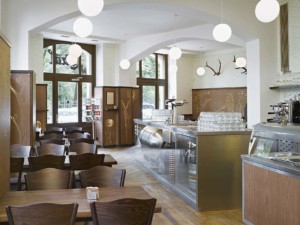
Earlier that day, I had received a letter from the U.S. Ambassador to the Czech Republic: the U.S. had announced a ban of all flights from Europe, the Fulbright program was being suspended as of March 31, and we were “strongly urged” to return home. Cynthia and I had spent all day trying to decide what to do. Should we cut short our dream semester, risk multiple cancellations, risk getting stuck overnight in a European city in a worse situation than ours (all flights from Prague to the U.S. went through virus-plagued Europe), risk catching the virus on one of the three flights we’d have to take, or, worse, unknowingly infecting others? Or should we stay put?
We guessed that because of the different reactions of the two governments, things might be getting worse in the U.S. just as they would be improving in the Czech Republic—but who knew? They are two completely different countries, in terms of both geography and personality. It seemed an impossible decision.
On the one hand, we were thousands of miles from home. During a pandemic. Thousands of miles from our parents, our children, our friends, our neighbors (including a dear friend with cancer), worrying about them constantly. What would we do if one of them were to fall ill? And if we stayed put and caught the virus, how would we negotiate a crowded hospital without knowing the language? And what if the shutdown lasted until the fall, or even longer?
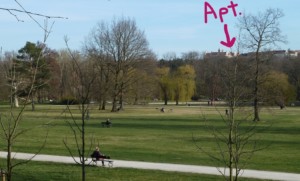 On the other hand, we seemed to be in a good situation. We had chosen a great apartment, right next to the largest park in the
On the other hand, we seemed to be in a good situation. We had chosen a great apartment, right next to the largest park in the 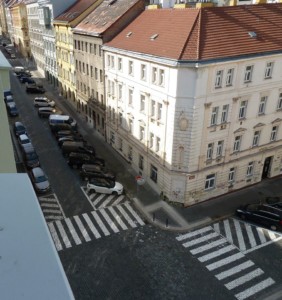 city, Stromovka (the arrow on the photo points to our building), which dates back to 1268, a park with steep hills, well-groomed paths, and wide pathways on which to stroll or bike—in other words, an easy place to walk around without ever bumping into anyone. Which we were doing, every day.
city, Stromovka (the arrow on the photo points to our building), which dates back to 1268, a park with steep hills, well-groomed paths, and wide pathways on which to stroll or bike—in other words, an easy place to walk around without ever bumping into anyone. Which we were doing, every day.
Also, we had learned that the Czech Republic, with a two percent unemployment rate and a populace that supports local farmers (most Czechs get their produce at farmers’ markets, not at the supermarket), is largely self-sufficient: the grocery stores were well stocked, and I already had an account with a internet-based grocery-delivery service called Rohlik, which had been up and running for years and knew just what to do with a suddenly ramped-up demand. Within three blocks of our apartment building were two mid-sized grocery stores and plenty of smaller shops selling essentials—six convenience stores, a fresh-produce shop, a vegan food store, a bakery that was now selling fresh pastries, lasagna, and bread at their doorway, an Italian deli, and three pharmacies—and not one had more than a few people in it at any one time. When we contrasted this situation to what we were hearing from our friends back home (the wiped-out shelves at grocery stores, people either hoarding or desperately seeking toilet paper) it seemed wiser to simply stay put. (One day when it looked as if we might need toilet paper in the near future, I donned a face mask, walked to the end of our block, bought a pack of sixteen rolls, and was back home within five minutes.)
Moreover, the Czech people were born for social-distancing. Well before the COVID-19 outbreak, I had noticed the locals tended to mind their own business. In the halls and stairway of our apartment building, residents smiled and greeted one another (“Dobry den!”), but out in the streets, there were no such interactions. When I passed people on the sidewalk, they kept their eyes down, or forward, and went about their tasks. (Once I was stunned to see three young people at a tram stop, hugging each other and talking loudly, but then quickly realized they were Italian.) So I could be certain, any time I left the apartment, I would not come into close contact with anyone.
Another consideration was financial: we had rented the apartment for five months, and the cancellation penalty was stiff; we’d have to pay that penalty and buy a new one-way flight. (The airlines we flew to get to Prague were no longer making trips from Europe.) And back home, a friend of ours was renting our house, so we would lose that income as well. And what would he do if we suddenly announced we were coming home?
And finally, we had made friends in Prague, especially two of my colleagues at Charles University and 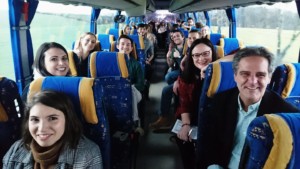 several of my Fulbright scholars, along with dozens of young Fulbright Teaching Assistants, kindhearted and smart, as much in love with the country as we were; and most of them were staying put. The Czech Fulbright Commissioners, too, had become our friends, giving us support, guidance, and yes even love, every day. In other words, if we were to stay, we wouldn’t feel alone.
several of my Fulbright scholars, along with dozens of young Fulbright Teaching Assistants, kindhearted and smart, as much in love with the country as we were; and most of them were staying put. The Czech Fulbright Commissioners, too, had become our friends, giving us support, guidance, and yes even love, every day. In other words, if we were to stay, we wouldn’t feel alone.
Unable to decide, we had come up with a short-term plan that would buy us some time: we had booked a flight home with a full-refund-within-24-hours policy, just in case. Then we went to Lokal, ordered two frothy glasses of Pilsen, and continued to deliberate. Maybe we could fly back to Colorado, then return to the Czech republic for the months of May and June? But what if the pandemic hasn’t eased by then? Or what if it eased in the Czech Republic but worsened in the U.S. and the Czech Republic banned flights from the U.S.?
Then again, no matter how long it took, if it meant being able to come back to this pub and to drink this beer again, it would be totally worth the wait.
The next day, we canceled that reservation. Taking that flight, or any flight that weekend, seemed less safe than staying put. There were reports of hellaciously long lines at the U.S. airports, because thousands of Americans were returning home at the same time, on a limited number of flights. We decided to wait and see.
Then on March 16, the eleven million citizens of the Czech Republic, along with any remaining foreigners, were placed in quarantine.
Thus began our new life together, in isolation.
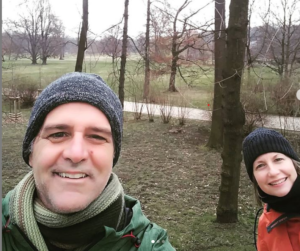 Cynthia was our researcher, reading multiple news sources and tracking flight availabilities (dwindling by the day). I continued to prepare for my classes (now on line) and working on my novel, treating the quarantine as a government-imposed writing retreat.
Cynthia was our researcher, reading multiple news sources and tracking flight availabilities (dwindling by the day). I continued to prepare for my classes (now on line) and working on my novel, treating the quarantine as a government-imposed writing retreat.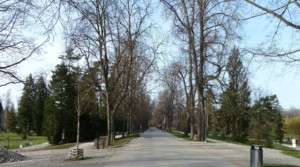 Cynthia and I woke up every morning, checked in with each other regarding our health, expressed our gratitude for being alive and well and able to work through this thing together, took a long walk in the park, worked, cooked up some delicious meals, and spent our evenings chatting over a cup of tea.
Cynthia and I woke up every morning, checked in with each other regarding our health, expressed our gratitude for being alive and well and able to work through this thing together, took a long walk in the park, worked, cooked up some delicious meals, and spent our evenings chatting over a cup of tea.
Then, after a week of quarantine, our decision was made for us, by way of a second letter from the U.S. Ambassador: the Fulbright program was being suspended, the U.S. Embassy was closing up shop, there would soon be no more flights leaving Prague, and we really needed to leave. Now.
We booked one of the last flights out of Prague.
Then, the women of the Czech Republic Fulbright Commission, who had been working around the clock and who’d been in contact with us every day, providing 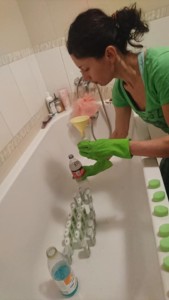 guidance and information and even hand-sewn face masks, became not only the best Fulbright Commission in all of Europe but our dear friends, our heroes. The day before our departure, Kristyna concocted dozens of travel-sized hand disinfectants for us; Hanka (the Executive Director herself) walked over to our apartment to bring us more face masks; and Klara stopped by to pick up some books for me. I handed Klara the books, and she handed me a package of delicious oranges and a bag of Czech candy. We were both wearing masks, and I couldn’t shake her hand in gratitude, but we hugged each other with our eyes.
guidance and information and even hand-sewn face masks, became not only the best Fulbright Commission in all of Europe but our dear friends, our heroes. The day before our departure, Kristyna concocted dozens of travel-sized hand disinfectants for us; Hanka (the Executive Director herself) walked over to our apartment to bring us more face masks; and Klara stopped by to pick up some books for me. I handed Klara the books, and she handed me a package of delicious oranges and a bag of Czech candy. We were both wearing masks, and I couldn’t shake her hand in gratitude, but we hugged each other with our eyes.
The next day, we, along with fellow Fulbright scholar Tara and some of the wonderful Fulbright English Teaching Assistants who had been living in small towns since August (teaching English in the local high schools), went to the nearly-empty airport in Prague and flew in a nearly-empty plane to London/Heathrow. 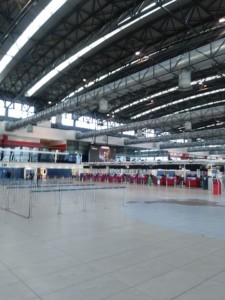 Then we boarded a packed, ten-hour flight from London to Dallas, passed through an almost non-existent check-in (a government employee asked us if we felt sick and reminding us to quarantine ourselves for fourteen days), and boarded a nearly-empty flight from Dallas to Denver. In Prague, everyone in the airport had worn face masks and kept their distance, but in London and Dallas, nobody did either.
Then we boarded a packed, ten-hour flight from London to Dallas, passed through an almost non-existent check-in (a government employee asked us if we felt sick and reminding us to quarantine ourselves for fourteen days), and boarded a nearly-empty flight from Dallas to Denver. In Prague, everyone in the airport had worn face masks and kept their distance, but in London and Dallas, nobody did either.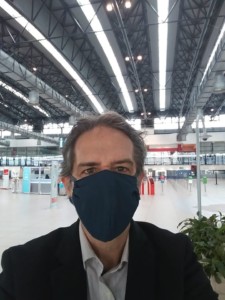
Cynthia and I kept our masks on and kept sanitizing our hands, unsure if such measures were protecting us or protecting the other passengers from us. But whatever the reason, we didn’t catch the virus.
When we arrived in Denver, after eighteen hours of travel, we found our car, which our friends (thank you, Lynetta and Jeremy) had driven to the airport and parked for us. We arrived home around one a.m., laughed when our dog Rosie came galloping out from our neighbors’ house in the dark of night to greet us, silently thanked Paul (our friend and renter) for cleaning the house for us and evacuating on such short notice, and fell asleep.
So now, once again, we’re in quarantine. And after this post-flight, fourteen-day quarantine is up, the state of Colorado will be in quarantine. So, this is our life now: a triple-quarantine.
But really, how lucky we are! We’re both alive and well. Our families (even, miraculously, my forty or so relatives in Italy) are fine. And we have a sweet little house, with quiet streets and a park just a block away. A former student is buying groceries for us and delivering them to our door. Our neighbors, who have chickens, are giving us eggs. A local farmers’ collective is delivering greenhouse-grown produce. And we both still have our jobs and can keep working at them, thanks to the internet.
But we sure do miss Prague. Cynthia and I had fallen in love with the city during a visit ten years earlier, and the cobblestones, the architecture, the river, the hills, still captivated us—in some ways even more so, assuming we had months, and not just days, to enjoy our new home. But it was all cut short.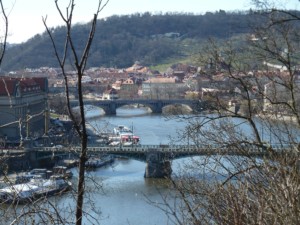
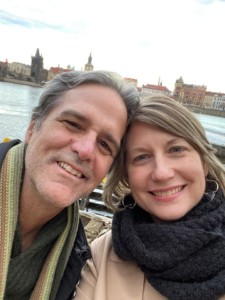
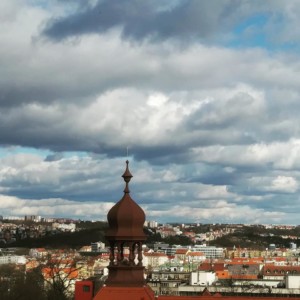
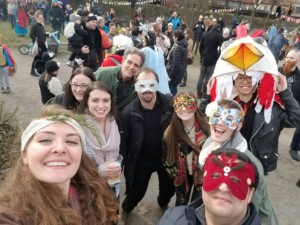
But what can you do? We let ourselves be sad for a day or two, but then we got right back into our “quaranroutine”: We wake up, check in with each other regarding our health, express our gratitude for each other, take a long walk, do our work, and spend out evenings chatting over a cup of tea—and watching television. We zoom-chat with our families in the afternoons. And I write every day, and teach my Czech students on line, while Cynthia works online as well. And every day, I am thankful to be married to my best friend.
Quarantine, schmarantine. We got this.
As for Prague, dearest Praha: Brzy se vrátíme.
[This blog post first appeared on www.daddyelk.com.]
![]()


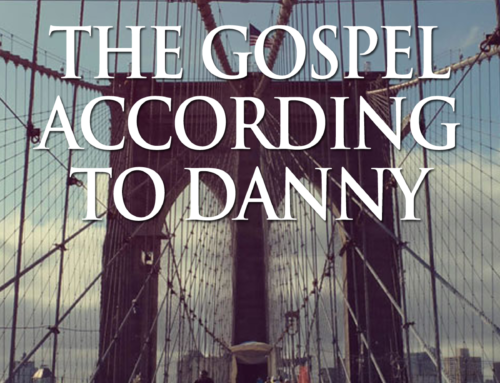
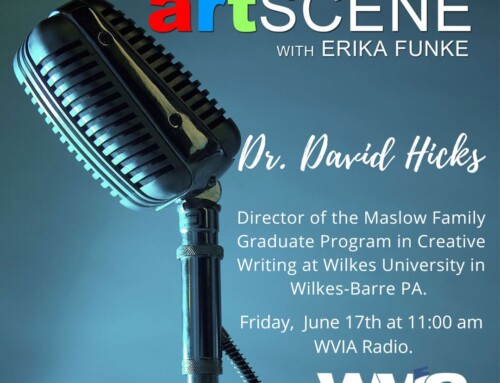
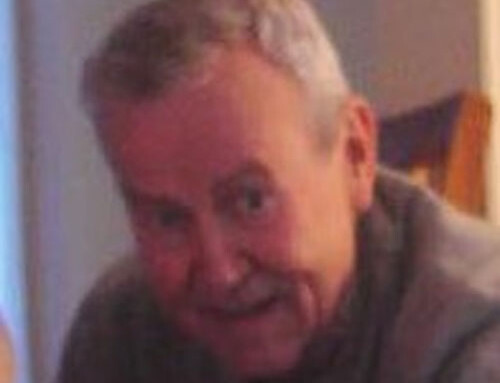
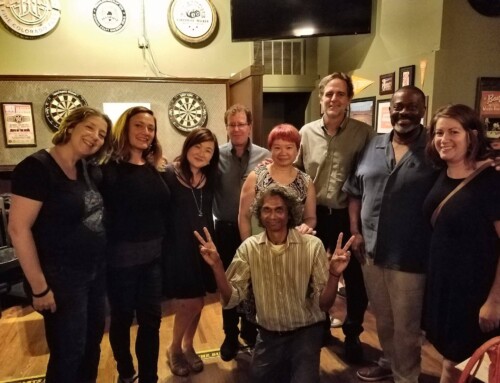
This certainly strikes a note of recognition! However, you had a much larger, longer ordeal and have missed out on so much more. But I’m glad you had the time you did and I hope you can go back one day and see all the things you wanted to see. I’m glad you wrote about this. :-)
Thanks, Shara! Actually I just heard I can go back. The Fulbright Board decided to allow all the current Fulbright scholars whose trips were cut short to reapply without the usual waiting period. So I can apply to go back in 2021-2022. I just need to convince people to accept me again. :-)
This was such a pleasure to read. I didn’t realize you were a Fulbright scholar Dr. Hicks! I’ve been pining for a position like that after graduation or sometime in the future… Sorry your time was cut short. I certainly know what that feels like after having to leave Seville so soon! Just wanted to say thanks for inspiring courage and confidence in me as a writer and as one of your former students. Happy to see that you’re well. Congrats on the new gig. ¡Saludos!
Hi Seth! I never saw this, sorry. Thanks for your kind words. :-) I’ll email you separately–I think you should apply for a Fulbright. (Seriously.)